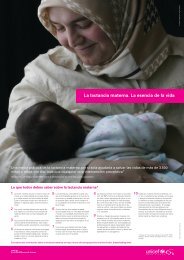SEXUAL ABUSE AND EXPLOITATION OF BOYS IN SOUTH ASIA A ...
SEXUAL ABUSE AND EXPLOITATION OF BOYS IN SOUTH ASIA A ...
SEXUAL ABUSE AND EXPLOITATION OF BOYS IN SOUTH ASIA A ...
Create successful ePaper yourself
Turn your PDF publications into a flip-book with our unique Google optimized e-Paper software.
Social Affairs, Martyrs and Disabled (MoLSAMD) and capacity to train social workers. It<br />
also calls for cooperation with NGOs to support extremely vulnerable groups and provide<br />
family reintegration options. 127<br />
The National Plan of Action against Child Trafficking was adopted in 2004. The NPA was<br />
formulated with reference to the Convention on the Rights of the Child and covers protection,<br />
prevention, recovery and reintegration, cooperation, and partnerships with children and young<br />
adults. The prevention section contains broad measures covering education, vocational<br />
training and awareness-raising, as well as the development of child protection committees.<br />
However, the NPA does not envision the development of a national, integrated, communitybased<br />
child protection system. The primary weaknesses in the NPA are generalized ‘strategic<br />
objectives’ and unclear descriptions of actions needed to achieve them. Government<br />
departments and agencies, international organizations and NGOs are all responsible for<br />
implementation of the NPA.<br />
The primary institutions that monitor human rights abuses, including trafficking, are the<br />
Afghanistan Independent Human Rights Commission (AIHRC) and the United Nations<br />
Mission to Afghanistan. The new Afghan Constitution, adopted on 5 January 2004, provided<br />
for the AIHRC. It has reviewed the country’s legislation on trafficking and submitted<br />
recommendations to the Judicial Commission. These recommendations, among others,<br />
informed the development of the NPA against Child Trafficking. The AIHRC is responsible<br />
for implementing initiatives under the NPA. Its Children’s Rights Unit has identified<br />
trafficking as one of the most important concerns facing children in Afghanistan.<br />
The Ministry of Justice, with support from IOM, has drafted a Law on Combating<br />
Kidnapping and Trafficking in Persons, currently under review by other ministries. Antitrafficking<br />
offices have been established in the Attorney General’s office in all provinces. The<br />
Ministry of Interior is a central player in addressing human trafficking. Although gaps in<br />
legislation prevent the direct prosecution of trafficking, the Ministry of Interior undertakes<br />
anti-trafficking efforts under laws related to kidnapping and sex crimes.<br />
The Afghan National Police is designated responsible for detection, investigation and<br />
prosecution of trafficking cases as well as identification of victims. Its Criminal Investigation<br />
Department has created a Counter Trafficking Unit and provided officers, trained by IOM,<br />
dedicated to investigating trafficking cases. The unit has gathered all available statistics on<br />
human trafficking cases for the year ending March 2008. The Criminal Investigation<br />
Department also contains the Sex and Behaviour-Related Crimes Unit, which investigates<br />
trafficking for prostitution. However, as prostitution is poorly defined in the Afghan Penal<br />
Code, this unit has primarily focused on arresting the ‘procurers’ of sex acts.<br />
A National Strategy for Children at Risk was developed in 2006 under the leadership of the<br />
MoLSAMD. The strategy encompasses a broader scope of child protection than the<br />
trafficking NPA, covering children with disabilities, children living on the street, children in<br />
conflict with the law, child soldiers and kidnapped and trafficked children. The strategy notes<br />
127 Islamic Republic of Afghanistan, 2007, ‘Afghanistan national development strategy 2008-2013’.<br />
39










